VMU organised the first Disability Inclusion Forum

This year, Vytautas Magnus University (VMU) organised the first-ever Disability Inclusion Forum 2022. As the University implements the Disability Inclusion Policy and seeks to increase the accessibility of higher education for students with disabilities, it has become more and more important to talk about the needs, experiences and challenges of students with disabilities in the study process, especially in the context of the social dimension, and ways to make the study process more accessible to students with disabilities in a way that will ensure the successful completion of their studies and access to higher education.
The number of students with disabilities who choose to study is falling
Lithuanian higher education is facing the problem that the number of students with disabilities has been consistently falling for several years now, a tendency that indicates the prevalence of systemic barriers in higher education, which create barriers and lead to one of the main problems – drop-out. The moderator of the forum, Simona Aginskaitė, Communications Project Manager of the Lithuanian Disability Forum, said that as a representative of the Lithuanian Disability Forum, which brings together organisations representing different disabilities and people with disabilities, she notices that the attention to disability is definitely more than it was in the last seven years.
“In general, education is one of the key themes in our organisation, because all levels of education are important in the life of every person, including a person with a disability, and for their future prospects. Looking at and tracking the results, of the number of students in the higher education sector, we can see a drastic drop. According to the Department for the Affairs of Disabled, from 2015 to 2019, the number of students with disabilities dropped from 1000 to 620. This huge drop shows that the reasons for the drop in students are not only a problem in the higher education sector but also in access and entry to higher education,” said the moderator of the forum, S. Aginskaitė.
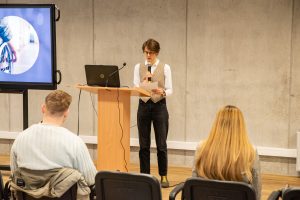
Personalised attention will be shown
In her welcoming speech to the participants of the Forum, the Vice-Rector of Communication of VMU, Dr Vilma Bijeikienė, shared her thoughts about the special attention to the University community. The Vice-Rector said that during the preparation of the VMU Strategic Plan, all work and discussions were carried out together with the community members in order to hear and involve the diverse groups of the University. There was also work on the disability policy document “University of Inclusive Opportunities”, which commits to providing opportunities for all, responding to the needs of diverse people.
“Building on our core values such as academic and personal freedom, harmony, creativity and democracy, we feel a very strong commitment to fostering the diversity of our community, to responding to the needs of all, and to being able to be there for everyone. And this is not a question of writing a single document, it is the daily work that the disability coordinators do at our university”, said V. Bijeikienė.
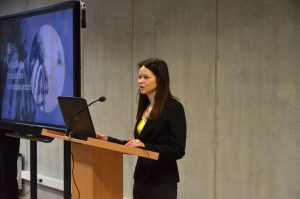
Miglė Janušauskaitė, the VMU Disability Coordinator, presented the University’s disability policy and the main aims of the event. The coordinator said that the University works within the social model of disability, where all members of the community are free to contact the disability coordinator, regardless of their disability or individual health-related needs. The University aims to listen to everyone’s needs and to provide reasonable and supportive conditions for study, and for the first time a Disability Inclusion Forum is being organised as part of the disability policy “University of Inclusive Opportunities”. “Every day we are working and trying to make sure that this is not just a document that brings together the whole University system, which the community has been building for a long time and has a tradition of inclusiveness when it comes to people with disabilities or with individual needs,” said Miglė Janušauskaitė, Disability Coordinator of the VMU.
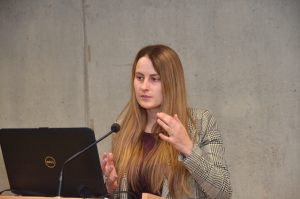
Different speakers and topics at the Forum
The main aim of the forum is to discuss and review the current situation in higher education for people with disabilities in the context of the social dimension, from the point of view of the entry to university, the study process and the aspiration to successfully complete and graduate from higher education.
Equal opportunities are at the core of democracy and balanced growth – in his presentation “ Accessible studies – equal opportunities!” said a professor at VMU and Vice-President of the UN Committee of the Rights of Persons with Disabilities, Jonas Ruškus. It is the responsibility of the state and government to ensure human rights and inclusion so that people with disabilities can fully and effectively participate in society on an equal basis with everyone else – for example, by creating inclusive education, pupils and students with disabilities should be given equal opportunities to get an education.
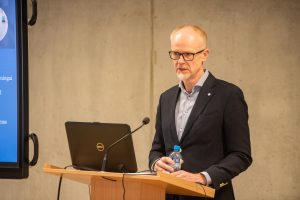
“Inclusive opportunities in a university, college, company or organisation are a message to the world, a message to ourselves. We want and seek diverse environments, we want people with disabilities and others to have all the opportunities they need to achieve their goals. Supports such as universal design, personal assistants, alternative communication, and reasonable accommodation – these are the norm, they are a must, they have to happen, and they have to become part of the everyday organisational culture. We are working towards this because this is what is needed to ensure equal opportunities for all, especially for those who are discriminated based on disability”.
The online presentation “Social Dimension in Lithuanian Higher Education from the Beginning: how pupils with disabilities can access higher education” was given by Indrė Širvinskaitė, former coordinator of Disability Affairs at Vilnius University (VU) and disability expert. In her presentation, the disability expert presented and summarised the research conducted in Lithuania on the barriers for pupils in accessing higher education. According to the expert, parents’ and teachers’ attitudes, pupils’ self-esteem, motivation to study, exemptions from final exams, or financial support provided by higher education institutions are the most common factors affecting the decision of persons with disabilities to study. Although the dominant factor in the choice of higher education institutions is that pupils choose their studies according to the specialisation they wish to study, for pupils with disabilities the physical accessibility of the institution, the flexibility of the form of study, the adaptability of the study process, the services provided by the institution, or the geographical aspect of the institution have a significant impact on the choice of the study programme they wish to study.
“The difficulties pupils with disabilities are facing in getting into higher education are due to the lack of positive measures at the school stage, such as professional or study guidance, information sharing, mentoring. There are also challenges in adapting final exams, the possibility of exempting pupils from exams and the system’s lack of access integration, coordination, guidance and control at all levels of education”.
The presentation on “The Concept of the Social Dimension – Perspective of the Ministry of Education, Science and Sport” was presented by Andrius Zalitis, Adviser to the Minister of Education, Science and Sport on Higher Education (Studies). In his presentation, the Advisor to the Minister spoke about one of the fundamental principles of mirroring, when trying to realise a common political ambition, to create a reality in which higher education communities represent the structure of society. Here, Lithuania is facing a quite serious problem, because the percentage of people with disabilities in higher education is not high, and the number of people with disabilities has fallen quite sharply.
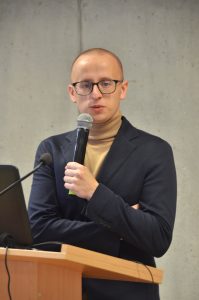
“If we have a certain percentage of people who have a disability, are from a low socio-economic status or a minority ethnic group, etc., then we should have a corresponding proportion in higher education. The decline in the number of students with disabilities is due to demographic changes, but this fact alone does not explain this negative number change”.
Andrius Zalitis shared plans that at the moment the first social dimension plan in Lithuania is being prepared, together with student organisations, rectors, college directors, conferences, and the State Studies Foundation, a document is being formulated and discussed, which should provide guidelines on how this policy area should be developed in the next four years.
In his presentation “The Concept of Social Dimension – from the Perspective of the Lithuanian Students’ Union (LSS)”, LSS Vice President Paulius Vaitiekus accentuated that to expand the concept of accessibility, it is necessary to look at the situation from the student’s perspective and to evaluate the satisfaction with the current systems of financial, psychological and academic support. “If we want to help students with individual needs to get a quality and equal education and provide effective support that eliminates limiting factors, the state and its higher education institutions need to not only understand but also meet the needs and expectations of such students,” said P. Vaitiekus.
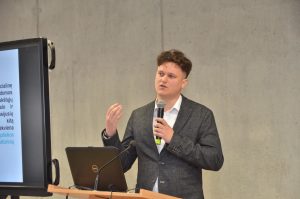
The research showed that for 40% of the students surveyed, their disability or health impairment had an impact on their choice of higher education institution or study programme. The research evaluated the overall study process and the individual support system measures: academic, financial, and psychological.
77% of the students in the research need help in their study process, while 44% said they need personalised study, including 30% who said they have had assignments adapted to their individual needs. One in five students is dissatisfied with the methods used by lecturers and 34% say that the methods used did not meet their individual learning needs.
Looking at the financial support system measures, 42% of respondents said they would not be able to cover unexpected expenses that might arise, and 38% of the students surveyed would not be able to cover expenses of up to €100. 35% of respondents need substantial family support and 90% of respondents in the research receive financial support in general.
In the evaluation of psychological support measures, according to the research responses, in the last year, the participants had to experience intense stress, changes in eating habits and depression. Only 18% of respondents said they would seek help from a higher education institution if they had experienced (or were experiencing) these situations, while 43% would seek help from a psychologist. The research revealed a tendency for students experience difficulties during their studies due to their study load and lack of motivation.
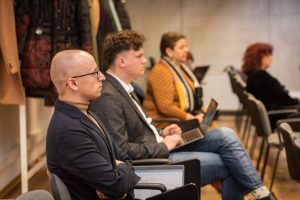
Presenting the Forum’s final report “Studying from – to: how possible is it for students with disabilities?” disability expert Indrė Širvinskaitė touched upon the topic of drop-out of students with disabilities. She talked about research carried out with students with disabilities. The results of the research showed that the main barriers that lead to drop-out are the accessibility of the environment, reasonable accommodation and the general flexibility of the study process. The analysis of the research results concluded that students with disabilities often face difficulties in adapting their studies in addition to the difficulties inherent to all students, that students with invisible disabilities are overlooked in the process of studying, and those systemic problems are brought in from schools so that pupils are often not properly prepared for their studies and are unaware of their rights. “The disability aspect needs to be effectively integrated into all parts of the higher education system: monitoring, funding, quality assessment and finally we should look at accessibility as part of the quality of studies”, commented I. Širvinskaitė.
Discussions on “How to ensure access to higher education for students with disabilities: from school to graduation?” During the discussion, the speakers discussed the situation of access to higher education for students with disabilities and the challenges they face during their studies in the context of the social dimension. They reviewed the main barriers, discussed the main obstacles and aimed to define and develop guidelines for recommendations on how to increase the accessibility of studies for people with disabilities.
The project “Forum for Inclusion of Students with Disabilities (Individual Needs)” is funded by The State Studies Foundation.
The Forum’s presentations and participants’ discussions can be viewed here.
* All event presentations were translated into Lithuanian Sign Language.












